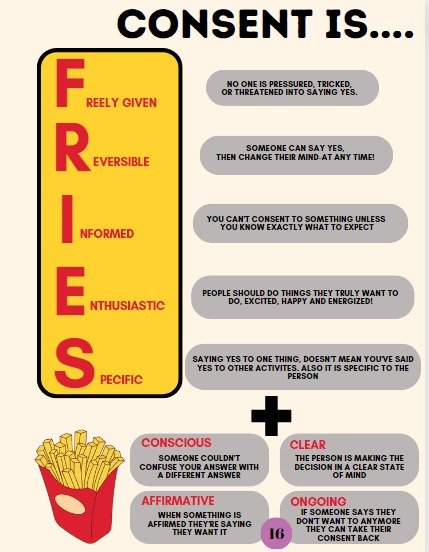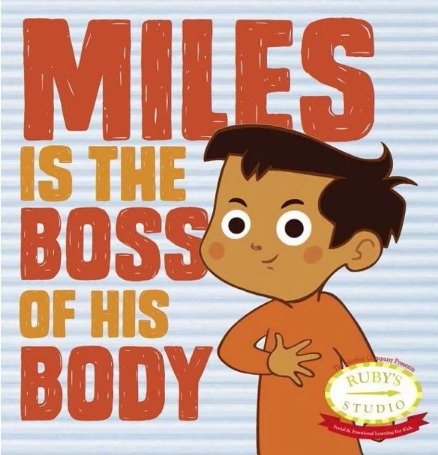How To Talk to Kids About Consent
At what age should I talk to my child about consent?
As soon as kids can understand what you are saying, you can begin to talk to them about consent. The earlier you start building foundational concepts about consent and body ownership, the more likely your kids are to be able to apply those skills later on. Practicing and learning these skills can begin in toddlerhood, and we wrote this blog to help you find a starting point at any age!
First of all… What is consent?
Here at Bridgercare, we like to say that consent is F.R.I.E.S. + conscious, ongoing, clear, and affirmative!
F: Freely Given. No one is pressured, tricked, or threatened into saying yes.
R: Reversible. Someone can say yes and then change their mind later!
I: Informed. You can’t consent unless you know exactly what to expect.
E: Enthusiastic: People should do things that they are excited about. Saying “I guess” is NOT enthusiastic.
S: Specific. Saying yes to one thing doesn't mean you said yes to everything, and saying yes to one person doesn’t mean you’re saying yes to other people.
Conscious: Somone couldn’t confuse your answer with a different answer.
Ongoing: If someone says they don’t want to participate in an act anymore, they can revoke their consent at any point.
Clear: The person/people making the decision is in a clear state of mind.
Affirmative: When something is affirmed they are saying they want it.
Basically, we define consent as an ENTHUSIASTIC “yes” from all parties involved without any trickery involved.
Many associate “consent” with only acts that are sexual in nature – leading to some discomfort in talking about how it relates to young people and kids. But consent is actually related to anyone touching someone else in any way at any age, whether that encounter is sexual in nature or not. Here are a couple of examples:
Johnny’s grandma asks him if she can give him a hug. Johnny says “Yes Grandma! I would love a hug!” Johnny’s grandma gives him a big hug and then as she pulls away, she gives him a kiss on the cheek. Johnny really didn’t like the kiss on the cheek, but doesn’t feel like he can tell his grandma that. Is this interaction consensual?
Answer: No! Johnny’s consent was not INFORMED or SPECIFIC. He didn’t know his grandma was going to give him a kiss on the cheek.
Mari and Tom are kissing on Mari’s couch. Mari puts her hand on Tom’s genitals and asks if she can go further. Tom says “No, not tonight” and Mari says “Come on Tom, if you don’t I’ll tell your friends you said no” Tom nervously says “Okay… I guess we can”. Was this interaction consensual?
Answer: No! Tom’s consent was not FREELY GIVEN, REVERSIBLE, or ENTHUSIASTIC.
These are two examples of times when it may have seemed like someone (Johnny and Tom) gave consent, but in reality, it was not full consent by the F.R.I.E.S. definition.
That’s All Great, But How Do I Actually Talk to My Kiddo About Consent?
Toddlers
Let children know that they are the boss of their bodies!
Make it a house norm to be able to say no to hugs, kisses, tickles, etc. even if it is a close adult, family member, sibling, or friend!
Ask for the kid’s permission before any sort of physical contact and encourage them to do the same before touching you.
This helps to build a foundation in the idea that consent is informed and specific. Let Johnny know that he’s allowed to tell his grandma that he doesn’t want her to kiss him on the cheek! (You may need to back your kiddo up on this and have that tough conversation with “grandma” or another member of the family)
Preschool- Early Elementary
Talk about when it is appropriate for an adult to touch your genitals (with consent).
Go over some times when it may be necessary for someone else to look at or touch the child’s private parts:
Cleanliness
Changing Diapers—Keeping them clean and healthy
Washing private parts—let them know that they can do it themselves, but if they don’t do a good job, they may need help from their adults.
When you’re hurt
When you have hurt your private parts, a doctor or your adult may need to look at your private parts to make sure they are okay. If a doctor is looking at or touching your private parts, your adult should be in the room with you!
Safety
Holding their hand to cross the street is necessary to keep them safe!
Help the child learn the correct names for their anatomy!
Knowing the correct names for anatomy (i.e. “penis” and “vagina/vulva”) makes it more likely that your kiddos will be able to tell you or another trusted adult if someone is touching them inappropriately, rather than trying to tell someone and using a term that is unclear (ex. Saying “Someone touched my cookie” rather than “Someone touched my vagina”) .
Work on how to express boundaries assertively. Teach them how to say no to something they don’t want to do.
Talk about how it is important to respect other people’s boundaries and be good listeners.
Help them identify safe adults and choose who they would feel comfortable talking to if they feel frightened by an experience.
Upper Elementary School:
Teach them the definition of boundaries and talk about how to set your own boundaries and how to respect others’ boundaries.
Start to talk about healthy relationships and how to respect people you have relationships with
Even if you’re just talking about friends and family at this point (Although it is pretty typical to be talking about crushes at this age) it is still important to lay foundational ideas about consent and trust in relationships for future conversations.
Go over the F.R.I.E.S. model of consent!
Middle School
Start talking about consent in romantic relationships. This is also a great time to talk about peer pressure and how it is okay to say ‘No’ to activities you feel uncomfortable with.
Talk about how consent can be impacted by how much power someone holds over someone else.
People in positions of power can often use their power (knowingly or unknowingly) to influence people “below” them to do things that they may not want to do. Talk with your middle schooler about how someone being you teacher, clergy member, or coach can affect how you feel about giving consent.
High School
Let’s not be like this guy^
Talk about consent in sexual contexts including in relation to alcohol and drugs and how those substances can impact someone’s ability to give consent.
Talk about consent being reversible. Explain that even if you are in the middle of a sexual experience, you or your partner(s) can still say no and stop the experience.
Go over the F.R.I.E.S. model of consent (yes, again)
Talking to kiddos about consent can be intimidating at times. When do I start? What do I talk about? How do I bring it up? These are all SUPER normal feelings to have! We hope that this blog helps you to feel empowered to find a starting point for chatting with your kids--at any age! Check out these resources to learn more:
Resources:
ABC of Body Safety and Consent
Miles is the Boss of His Body (Book)
How to talk to Preschoolers About Anatomy and Body Safety
Talking With Your Kids About Consent and Boundaries (plannedparenthood.org)
8 Ways to Teach Kids about Consent and Healthy Boundaries (endsexualviolencect.org)



